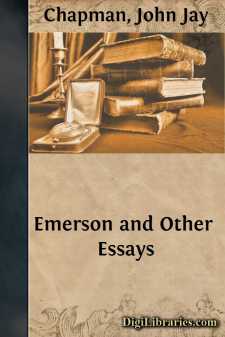Categories
- Antiques & Collectibles 13
- Architecture 36
- Art 48
- Bibles 22
- Biography & Autobiography 813
- Body, Mind & Spirit 142
- Business & Economics 28
- Children's Books 17
- Children's Fiction 14
- Computers 4
- Cooking 94
- Crafts & Hobbies 4
- Drama 346
- Education 46
- Family & Relationships 57
- Fiction 11829
- Games 19
- Gardening 17
- Health & Fitness 34
- History 1377
- House & Home 1
- Humor 147
- Juvenile Fiction 1873
- Juvenile Nonfiction 202
- Language Arts & Disciplines 88
- Law 16
- Literary Collections 686
- Literary Criticism 179
- Mathematics 13
- Medical 41
- Music 40
- Nature 179
- Non-Classifiable 1768
- Performing Arts 7
- Periodicals 1453
- Philosophy 64
- Photography 2
- Poetry 896
- Political Science 203
- Psychology 42
- Reference 154
- Religion 513
- Science 126
- Self-Help 84
- Social Science 81
- Sports & Recreation 34
- Study Aids 3
- Technology & Engineering 59
- Transportation 23
- Travel 463
- True Crime 29
John Jay Chapman
John Jay Chapman (1862–1933) was an American essayist, critic, and reformer known for his eloquent prose and sharp moral insights. He authored numerous works, including "Practical Agitation" and "Causes and Consequences," which reflect his advocacy for social and political reform. A passionate opponent of corruption and injustice, Chapman was also an outspoken critic of racial inequality, particularly in his essay "A Nation's Shame." His writing combined classical learning with a deep commitment to ethical principles, making him a prominent voice in American intellectual life during the late 19th and early 20th centuries.
Author's Books:
Sort by:
by:
John Jay Chapman
TREASON AND DEATH OF BENEDICT ARNOLD ACT I The margin of the Hudson at West Point. Fort Putnam and the Highlands in the distance. A flag is fluttering on the fort. The orchestra represents the level of the river shore, upon which level the Chorus will enter. The characters of the drama appear on a bank or platform, slightly raised above the orchestra and Chorus. At the opening of the play Father Hudson...
more...
by:
John Jay Chapman
EMERSON I "Leave this hypocritical prating about the masses. Masses are rude, lame, unmade, pernicious in their demands and influence, and need not to be flattered, but to be schooled. I wish not to concede anything to them, but to tame, drill, divide, and break them up, and draw individuals out of them. The worst of charity is that the lives you are asked to preserve are not worth preserving....
more...



